|
|
|
|
Canine Corner
|
January, 2012
|
|
|
|
|
Minutes of the RFKC Annual Meeting
Dec. 11, 2011
Held in conjunction with the Christmas Party held at the Glenwood Springs Community Center 1 - 5 pm
Members present were: President, Julianne Flaherty and Martin, Treasurer Davy Lampman, Secretary Laurie Raymond, Erin Galbreath, Joanne Karet, Jacquie Tannenbaum, Jeanne Huyser, Peggy Lange, Alwin Knirlberge, Barbara Yamaguchi, Carol McArdell, Britton Nieslanik, Cheryl McCulloch, Joanne Stanley, Karen England, Laura Van Dyne, Liz Colter, Terena Thomas, Liz Stonington
1. First item of business is the election of a new Vice President and filling a vacant seat on the Board of Directors. Erin Galbreath had been previously nominated for the VP position, and she was unanimously elected. Pamela Levy had been nominated for the Board seat, and she was also unanimously elected.
2. Second was the decision about whether or not to hold a show in 2013. On the question itself, members polled 100% in favor of having a show in 2013. The determining factors were whether enough people would volunteer for the critical functions, which had been identified and discussed at the November regular meeting. The members who have committed to the essential positions were named: Pamela Levy will be Show Chair, with Davy Lampman's assistance; Terena Thomas will chair Obedience and Rally-O; Joanne Karet will chair Hospitality; Britton Nieslanik will handle the RV space rentals; Sharon Sherwood will handle grooming. With these positions covered, the membership voted to go forward with plans for the 2013 show. There remain other tasks, such as Vendors and Catalog advertising pre-show, and grounds clean up after the show, but we felt confident that we will be able to enlist enough volunteers.
3. Third, we discussed the proposal from Heeling Partners to hold a joint Pooch Parade in the coming year. Many members attended the demonstrations organized by Laura Van Dyne in conjunction with the Sheepdog Trials at Strang Ranch this summer, and came away convinced that events that bring dog owners together in an entertaining and educational way capture a lot of attention and potentially bring new people into dog sports. We determined that May and September are the most auspicious months for outdoor events with dogs. Terena Thomas volunteered to organize the Fun Match, Laura Van Dyne the demos, and Jeanne Huyser the silent auction. The Boards of both Heeling Partners and RFKC will meet to plan other activities. Davy Lampman will check available dates in May for use of Two Rivers Park*. Other activities tentatively agreed upon for next year include a handling clinic with Bill Lauderdale, either late in 2012 or early 2013, before the show, and an event in September for Responsible Dog Owner Day.
4. Julianne reported on the progress of the RFKC Bylaws revisions, and it was determined that the Board will work on proposed changes and get them to the members for consideration as soon as possible.
5. Davy moved to award Bob and Cathie Jarnot lifetime membership for their many years of service to the club. This was unanimously affirmed.
The meeting was adjourned so that we could enjoy the Italian buffet catered by Staci and Val, and proceed to the party activities.
The January regular meeting will be at High Tails on the 11th, at 6 pm. Please rsvp to Laurie at: laurieraymond16@comcast.net or by calling High Tails at 947-0014, so we know how much pizza and beverages to have.
* The date for Pooch Parade is now confirmed: May 19th. Details to be determined.
Here's to another year of great shows, quality dogs and wonderful friends. And please remember to watch the AKC/Eukanuba National Championship on television if you couldn't make it to Orlando. The show will be broadcast on ABC during Superbowl Weekend, on February 4th. For Comments or Newsletter News, please send to:
|
2012 Roaring Fork Kennel Club Officers
President: Julianne Flaherty 9650 CR 311 Silt, CO 81652 Vice President: Erin Galbreath 115 Vista Drive Glenwood, CO 81601 (970) 379-3822 Treasurer: Davy Lampman 0789 Cactus Flats Rd Carbondale, CO 81623 (970) 963-1758 Secretary: Laurie Raymond 50633 Hwy 6 & 24 Glenwood, CO 81601 (970) 947-0014 Roaring Fork Kennel Club Directors Pamela Levy PO Box JJ Aspen, CO 81612 (970) 923-4567 pamelalevy@me.com Britton Nieslanik 7199 Cnty Rd, 115 Glenwood, CO 81601 (970) 928-0482 Terena Thomas 14503 Colorado River Rd. Gypsum, CO 81637 (970) 524-8724 |
High Tails Co-op Launches Membership Drive
After a year of preparations, High Tails went public with plans for converting the business into a cooperative in 2012. The Post Independent did a nice story on Dec 29, and the response has been very encouraging.
The idea of becoming a co-op is in part a response to the economy, and in part the result of my search for a business form that will allow High Tails to fulfill the mission Beth and I began it with: to enhance the lives of dogs and cats and their people in our valley by providing the highest quality products and services as affordably as possible, and to be a center for all the activities of interest and benefit to them.
Cooperatives are a business form in which the members are the owners, governance is democratic, and profits are distributed to members in proportion to their patronage. In addition, the members determine what programs and services have value to them as membership privileges.
Food and nutrition information is a key area to be developed in the members' interest. As pet food companies become ever more competitive and consumers acquire more savvy, the costs continue to rise beyond proportional increases in product quality. The two factors that drive up prices without increasing quality are, first, food safety and handling technology, and second, transportation. There are good products available, but with a certain amount of knowledge, owners can feed their pets much better, more affordably, and far more sustainably by purchasing locally raised components and making their own food. This allows for infinite adjustments to meet the needs of each animal. We intend for the co-op eventually to relocate to a larger facility where members can buy locally raised meat, poultry, fish, eggs and fresh produce, use the co-op's kitchen equipment (heavy-duty meat grinders, mixers, dehydrators, and frozen food locker) to prepare and store their pets' food. Wouldn't it be fun to produce a "cooking/no-cooking for pets" TV show, for online audiences?
This is one example of how we intend to cultivate and nurture knowledge and skill sharing. Other plans include a "lending library" of durable medical equipment, like wound-protector boots, comfortable alternatives to elizabethan collars, ramps and lift-assist harnesses, etc. Why should one have to purchase these expensive items when they are only needed for a short time? A library of educational materials like books, DVDs, and other forms would be a valuable resource to the community.
We are very fortunate in this area to have an unusually vibrant community of "animal people" - superb trainers like Terena Thomas, Laura Van Dyne, Tracey Yajko and Sarah Cox; many progressive and dedicated veterinarians, excellent shelters and rescue groups, service organizations like Heeling Partners and GarCo Search & Rescue, clubs like us, and many folks devoted to canine sports and work. How much more effectively all these can benefit each other and the larger community if we all coordinate with and support each other. How lucky for newcomers with pets to find a broad and diverse collection of groups that share their interests.
Joining the co-op costs $100 for a lifetime membership. We've opened an escrow account at Alpine Bank for the interim until the business transfer is accomplished. If the co-op does not come to fruition, the fees being collected now will be refunded. However, these moneys demonstrate the level of support for the effort, which will help us secure grants and cover start-up expenses. One of the biggies will be purchasing computer equipment and co-op accounting and management software. We also need interested people to help with the initial planning activities. Bring your skill and enthusiasm and join us! For more information, contact Laurie at High Tails, 947-0014 or 945-8723.
|
Training Classes:
Canine Consultant (Laura VanDyne) (970) 963-3745
CARE (Tracey Yeiko) (970) 945-9173
Canine Country School (Terena Thomas) (970) 524-8724
Classes at High Tails
Tracey Yajko will have a 6 week Beginner Manners class on Tuesday nights starting Jan. 10 from 7 to 8 pm. Cost is $110. This is appropriate for puppies and newly adopted dogs, or dogs needing a refresher in manners and basic commands.
Terena Thomas will have a "Reactive Rover" class on Thursday evenings. This is a very effective class for dogs who lose control when afraid - especially dogs who lunge aggressively at other dogs while on leash or behind a fence. Contact Terena to discuss whether this class would benefit your dog. We've seen some amazing transformations resulting from this class.
Continuing through January we will be holding our Saturday afternoon make-your-own petfood prep classes. These are sessions about 2-3 hours long in which you will make dog and/or cat food, raw and/or cooked, using whole food components. Cost is $35. Sign up at High Tails or call 947-0014.
Terena is offering an AKC Obedience Class (prepare for your dog's title) starting January 4th. 5:30-6:30 Glenwood. This class will help you prepare for the cluster of shows in February! Although this is a beginner obedience title, this is a moderate to advanced class. Training and proper handling etiquette will be addressed. Sign up now for this fun class at (970) 524-8724.
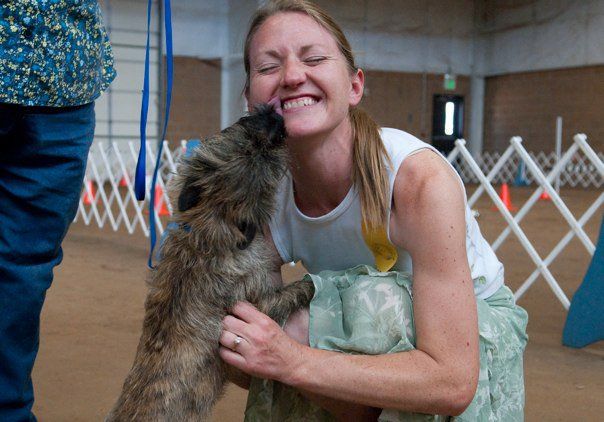 Photo Courtesy of Karen Church "Kerrie" the Cairn and Terena Thomas. Train Your Dog Month: Coming in January 2012 The Association of Pet Dog Trainers announces Facebook chats and free webinars on training and behavior issues! www.trainyourdogmonth.com The Association of Pet Dog Trainers believes it is long overdue to dedicate a month where we can bring awareness to the importance of socialization and training, and most of all, to inform the public that training your dog can be easy and fun! We selected January as the perfect month because so many dogs and puppies are adopted or purchased from breeders and brought home during the winter holidays. Our desire is to help these new pet parents start off the new year right with their newest family member. The APDT is planning a variety of events in January 2012 to celebrate National Train Your Dog Month. We want dog owners to see how simple and fun training can be, and how patience, consistency and a deeper understanding of a dog's behavior can lead to happier, healthier and harmonious households. It's our goal to promote using training methods that are kind, gentle and have an emphasis on building a relationship with your dog. 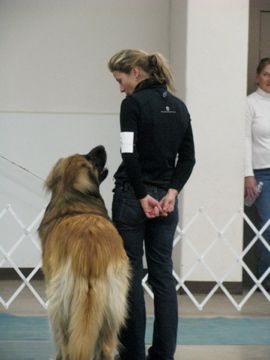
Free webinars, chats and documents on sports, adoptions, CLASS Program, housetraining, leash walking, etc. And it's not limited to dogs, there are also webinars and telechatting available for resolving litter box issues and dog- cat interactions and rabbit behavior to name a few. These is only available free in January, so check out this great resource and train your dog this month!
|
|
Stay Green All Year Long
Love of animals and concern for the environment and health seem to go hand-in-hand. This is probably why professionals are often asked about "green" alternatives to traditional chemical sanitizers and disinfectants. The truth is that traditional chemical sanitizers, used as prescribed by the label, pose little environmental or health risks. But there are relatively new products on the market that may be as effective as traditional chemical sanitizers while assuaging concerns some may have about health or the environment.
An important thing to know is that the terms "sanitizer" or "disinfectant" are legal designations. A product can only bear these words on its label after certification from the EPA. If a product doesn't say "sanitizer" or "disinfectant", it isn't. Another way to tell is the product will have an EPA registration number printed on the label, but these are small and can be hard to find. This article will briefly discuss two fairly new products that have received this EPA designation.
The first is thymol or thyme oil. This herb-derived chemical is now available under several different brand names. If you like the idea of a plant-based sanitizer, this may be something to look into. As you might imagine, it has a pleasant smell (thyme), which may be a welcome relief from bleach fumes. The manufacturers reviewed for this article don't recommend rinsing the product off, which may be a bit of a time-saver.
The second green sanitizer is Accelerated Hydrogen Peroxide (AHP). This is a proprietary term, and the understanding is that at this time the product is available from only one manufacturer. RFKC does not endorse any product or company, but we certainly want our members to be aware of their options. The company that produces this product is Virox; you may wish to visit their website. Most sanitizers contain volatile organic compounds (VOCs). These are the substances that cause strong odors, irritation, and at extreme concentrations, health issues. This product contains no VOCs. More surprising, the product is considered completely non-toxic (but I wouldn't mix it in a cocktail). This is a truly unique product; it requires a short contact time, it's odorless, and more.
|
|
Upper Respiratory Cases Prompt Increased Awareness
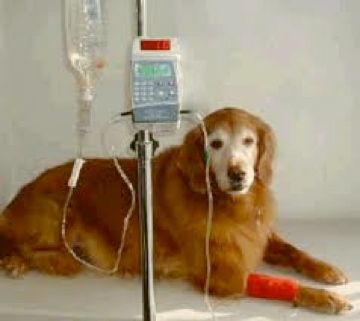
Around the Durango area this spring, an outbreak of upper respiratory disease in dogs concerned state and local agencies. Due to the high number of dogs presenting with clinical signs several veterinarians in the area became concerned about a possible outbreak of Canine Flu. The area veterinarians worked closely with CSU to test dogs in search of the influenza virus; however, testing at CSU and other laboratories never resulted in isolation of influenza. The final determination was that the outbreak was most likely a commonly occurring respiratory infection that appeared more like an epidemic due to the number of dogs affected. In all more than 150 dogs the majority of which attended local daycare and boarding facilities became ill and all made full recoveries.
There are lingering questions about Canine Flu. The researchers at CSU are continuing to gather information about the incidence of influenza in Colorado's dog population. A grant received from the Morris Animal Foundation is helping CSU conduct surveillance of the shelter dogs in Colorado and other states to help answer some of the questions.
The virus was first diagnosed in dogs in 2003 in Florida at a Greyhound racing facility. The signs of illness begin within 2-5 days of exposure and range from mild to severe. The mild form of infection causes a moist cough that lasts from 10-30 days. Some dogs will develop a dry cough similar to "kennel cough" or Bordatella infection which may cause some confusion in diagnosis. Dogs may also display a nasal discharge caused by a secondary bacterial infection. The severe form is characterized by high fever usually 104-106. This leads to pneumonia and ultimately death in a few cases. The fatality rate due to infection with the virus is low, generally between 5 and 8%; but it does affect the animal for an extended period of time and most dogs have little immunity. Vaccines are available and owners should work with their veterinarian to determine if vaccination is appropriate.
CIV is most easily spread where large numbers of dogs are housed together such as shelters, boarding facilities, shows or events and veterinary clinics. Facilities that house dogs together are urged to review sanitation and infection control with their veterinarian. Suspect cases should be placed in isolation until the shedding period is over. Infected dogs can shed the virus in respiratory secretions for up to 14 days. Good infection control practices can reduce the risk. Dog owners that take their dogs to shows, or other activities with dogs or who board their dogs at kennels should check with their veterinarian to ensure proper vaccination. They can also ask the kennel whether respiratory disease has been a problem there and whether the facility has an isolation facility for suspect cases.
|
Brags:
Scylla's Cinnamon Teal earned her RN (Rally Novice) at Grand Junction. Teal lives with Laura Van Dyne and was handled by Deb Keller. Their highest score was a 97 with 3 points deducted because Teal barked 3 times... She was having too much fun!
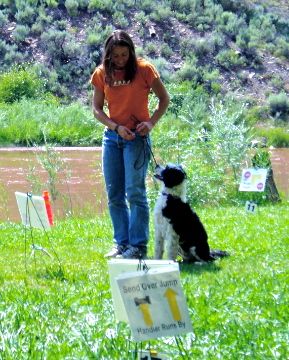
Ringo, was the #2 Stud dog in the country. Australian Terriers
are not a very big breed so he achieved that status in 2011 by siring only 3 champions. Not a very big brag. Pamela Levy
"Ringo" BISS GCH Black Back Firefly Ranked # 5 *Breed Points
|
|
Procter & Gamble Co. PULLS Iams ProActive Health Smart
Puppy Dog Food
In yet another black eye for the pet food industry, Procter & Gamble Co. (P&G) was forced to pull thousands of bags of its Iams ProActive Health Smart Puppy dry dog food due to elevated levels of aflatoxins, according to MarketWatch.com. The company is calling this a "product pull" not a recall.
Aflatoxins are common ingredients that result from mold that is produced in nuts, corn, wheat and seeds. Worse yet, in processed pet food they are even known to cause cancer in animals. The U.S. Food and Drug Administration allows these substances in trace amounts of pet food, saying that the small contaminants do not pose a significant enough risk to remove them completely.
The bags were sent to a number of states, including Alabama, Connecticut, Delaware, Florida, Georgia, Louisiana, Maryland, Maine, Mississippi, North Carolina, New Hampshire, New Jersey, New York, Pennsylvania, South Carolina and Virginia. The company suggests throwing out the bag immediately if you've purchased one. The early signs of aflatoxin poisoning are lethargy, decreased appetite or a yellow tinge in his eyes or gums, so you should see a vet immediately if your pooch has ingested any of the tainted food.
P&G voluntarily pulled 7-, 8- and 17.5-pound bags of the Iams dog food with use by or expiration dates of Feb. 5 or Feb. 6, 2013. The company said no illnesses were reported in relation to the affected product, but it was instituting this as a precautionary measure.
Those who bought the product are asked to stop using it immediately, throw it out and contact Iams for a replacement voucher.
Reports like these illustrate the importance of a natural feeding plan, so consider giving your companion a meat-rich raw diet with a dog supplement (Laurie at High Tails is a wonderful resource on pet foods). This can drastically improve his quality of life and increase his longevity.
Aflatoxin is not a word that is tossed around in everyday conversation. But as a dog owner, it's a term you NEED to be familiar with! This nasty bugger is the main cause of many dog food recalls. It has caused serious illness and death in dogs.
Aflatoxin exposure was brought to the attention of canine owners in late 2005 when a number of dogs became sick and some died from eating contaminated dog food. The aflatoxin effects almost went undiagnosed except for one observant vet who noticed that several dogs brought to him were all suffering the same symptoms. Once brought to the attention of the public through media reports and as more and more cases were uncovered, the epidemic like proportion of this was uncovered.
After investigation, it was determined that certain pet foods made by Diamond Brand Pet Foods at their Gaston, South Carolina plant, and distributed in 23 U.S. states, were contaminated with Aflatoxin. Contaminated pet food was distributed to stores in Alabama, Connecticut, Delaware, Florida, Georgia, Kentucky, Maine, Maryland, Massachusetts, Mississippi, Michigan, New Hampshire, New Jersey, New York, North Carolina, Ohio, Pennsylvania, Rhode Island, South Carolina, Tennessee, West Virginia, Vermont, and Virginia, and in a number of countries, including several in the European Union, according to reports.
As pet owners began to stream into veterinary clinics with pets exhibiting signs of liver problems, the most discouraging aspect of aflatoxin poisoning became apparent. At Cornell, University Vet School in Ithaca New York, two thirds of the aflatoxin-exposed canines under their care, did not survive.
What should a pet owner do if aflatoxin exposure is suspected?
First, be familiar with the symptoms of aflatoxin exposure which include lethargy, sluggishness, anorexia, vomiting, bloody diarrhea and yellowing of the eyes. If your pet exhibits any of these symptoms, seek veterinary care. Tests have been developed that can detect liver damage in dogs caused by aflatoxin exposure. If you believe that your dog may have eaten food contaminated by aflatoxin, ask your vet to order a lab test for confirmation.
For more information on afllatoxin testing, go here: http://diaglab.vet.cornell.edu/news/aflatoxin.asp
Undoubtedly, canine owners were alarmed when word of the Diamond Pet Foods dog-food recall hit the papers. However, as frightening as the incident was, it is important to remember that these kinds of episodes are few and far between. Dr. Karen Bischoff, a Veterinarian, Diagnostic Toxicologist, and Diplomate of the American Board of Veterinary Toxicology, observed that "large-scale contamination problems are a very rare event," occurring only "a very few times in the past several decades." Dr. Bischoff points out that many dog food manufacturers regularly test the ingredients that go into their pet foods and an increasing number are testing their foods post manufacture. Even so, she observes, "No test method is fool proof and no food supply is 100% safe." Since mold doesn't grow evenly in a batch of food (think of the way mold grows on cheese, or a bag of oranges, for example) it is possible to miss a "hot spot" of contamination.
Of greater concern, is the possibility of contamination due to food spoilage. According to Dr. Bischoff, mold can grow and produce toxins on pet food just as it can on grain or anything else and that post-purchase handling of pet food by consumers is a more likely source of mycotoxin contamination than a manufacturing error. Even in the absence of mold growth, Bischoff adds, fats in the food can become rancid and vitamins can break down and these factors could cause animals to refuse to eat the food or, possibly, result in other health problems.
Since moisture, humidity, and warmth encourage mold growth and nutrient degradation, it is important to store pet food properly by keeping it in a cool and dry place. Food should never be allowed to become wet in the bag or in the container, Bischoff cautions. If you use containers to store your food, all the food in the container should be used and then the container should be cleaned, rinsed and dried prior to adding new food. Don't just add new food on top of old food, Bischoff warns, otherwise you may just transfer any contamination present to the new food. Also, when purchasing dog food, do not stockpile it for longer than it takes your dog to consume in a month or so. Fresh food means that molds have less time to grow and produce toxins. Finally, it is also helpful, Bischoff suggests, for people who store food in containers to save the original bag or proof of purchase info, in the unlikely event that contamination occurs. This will help identify the manufacturer and lot number of food that you purchased.
(information obtained from hyperflight.com)
|
We continue to update the website.
How can you help? We need your photos! We need your suggestions! We need to know if you have a website and would like to have it included on the RFKC page. Please send photos, thoughts, websites etc. To view the website Click Here This is YOUR club let's make it really wonderful!! Please send your info to pamelalevy@aol.com
|
|
By Helping a Girl Testify at a Rape Trial, a Dog Ignites a Legal Debate
POUGHKEEPSIE, N.Y. - Rosie, the first judicially approved courtroom dog in New York, was in the witness box here nuzzling a 15-year-old girl who was testifying that her father had raped and impregnated her. Rosie sat by the teenager's feet. At particularly bad moments, she leaned in.
When the trial ended in June with the father's conviction, the teenager "was most grateful to Rosie above all," said David A. Crenshaw, a psychologist who works with the teenager.
"She just kept hugging Rosie," he continued.
Now an appeal planned by the defense lawyers is placing Rosie at the heart of a legal debate that will test whether there will be more Rosies in courtrooms in New York and, possibly, other states.
Rosie is a golden retriever therapy dog who specializes in comforting people when they are under stress. Both prosecutors and defense lawyers have described her as adorable, though she has been known to slobber.
Prosecutors here noted that she is also in the vanguard of a growing trial trend: in Arizona, Hawaii, Idaho, Indiana and some other states in the last few years, courts have allowed such trained dogs to offer children and other vulnerable witnesses nuzzling solace in front of juries.

The new role for dogs as testimony enablers can, however, raise thorny legal questions. Defense lawyers argue that the dogs may unfairly sway jurors with their cuteness and the natural empathy they attract, whether a witness is telling the truth or not, and some prosecutors insist that the courtroom dogs can be a crucial comfort to those enduring the ordeal of testifying, especially children.
The new witness-stand role for dogs in several states began in 2003, when the prosecution won permission for a dog named Jeeter with a beige button nose to help in a sexual assault case in Seattle. "Sometimes the dog means the difference between a conviction and an acquittal," said Ellen O'Neill-Stephens, a prosecutor there who has become a campaigner for the dog-in-court cause.
Service dogs have long been permitted in courts. But in a ruling in June that allowed Rosie to accompany the teenage rape victim to the trial here, a Dutchess County Court judge, Stephen L. Greller, said the teenager was traumatized and the defendant, Victor Tohom, appeared threatening. Although he said there was no precedent in the state, Judge Greller ruled that Rosie was similar to the teddy bear that a New York appeals court said in 1994 could accompany a child witness.
At least once when the teenager hesitated in Judge Greller's courtroom, the dog rose and seemed to push the girl gently with her nose. Mr. Tohom was convicted and sentenced to 25 years to life.
His lawyers, David S. Martin and Steven W. Levine of the public defender's office, have raised a series of objections that they say seems likely to land the case in New York's highest court. They argue that as a therapy dog, Rosie responds to people under stress by comforting them, whether the stress comes from confronting a guilty defendant or lying under oath.
But they say jurors are likely to conclude that the dog is helping victims expose the truth. "Every time she stroked the dog," Mr. Martin said in an interview, "it sent an unconscious message to the jury that she was under stress because she was telling the truth."
"There was no way for me to cross-examine the dog," Mr. Martin added.
In written arguments, the defense lawyers claimed it was "prosecutorial misconduct" for the Dutchess County assistant district attorney handling the rape case, Kristine Hawlk, to arrange for Rosie to be taken into the courtroom. Cute as the dog was, the defense said, Rosie's presence "infected the trial with such unfairness" that it constituted a violation of their client's constitutional rights.
Ms. Hawlk declined to discuss Rosie. In written arguments, she said that all Rosie did was help a victim suffering from serious emotional distress, and she called the defense claims "frivolous accusations."
The defense lawyers acknowledged the risk of appearing antidog. Rosie, they wrote, "is a lovely creature and by all standards a 'good dog,' " and, they added, the defendant "wishes her only the best."
As the lawyers prepare their appeal, Rosie has been busy. She spent much of her time in recent weeks with two girls, ages 5 and 11, who were getting ready to testify against the man accused of murder in the stabbing of their mother.
The Dutchess prosecutor in that case, Matthew A. Weishaupt, argued that Rosie and dogs like her did not affect the substance of the testimony about horrifying crimes. "These dogs ease the stress and ease the trauma so a child can take the stand," Mr. Weishaupt said in an interview.
In the end, Rosie was not needed in the second case: the defendant, Gabriel Lopez-Perez, who had a history of domestic violence, interrupted his trial last week to plead guilty to killing the girls' mother, his girlfriend, in the Wappingers Falls rooming house where they lived.
But Rosie's promised appearance next to the children might well have played a role. "It became obvious," said Mr. Lopez-Perez's lawyer, Andres Aranda, "that the children were going to be testifying, and he decided to avoid that."
The defense's appeal of Rosie's first courtroom outing, in the rape case, is likely to establish legal principles on the issues of dogs in the witness box. "It is an important case, and appeals courts will consider it an important case," James A. Cohen, a professor of criminal law at Fordham University School of Law, said.
When New York appeals courts study the question, they are likely to look at the experience of courtroom dogs around the country, including in Washington. In Seattle, a developmentally disabled 57-year-old man, Douglas K. Lare, recently recalled how a Labrador retriever named Ellie, who has made more than 50 court appearances, helped him testify against a man charged with a scheme to steal from him.
Ellie gave him courage when he was afraid, Mr. Lare said in an interview: "It was like I had no other friends in the courthouse except Ellie," he said.
For 11-year-old Rosie, said her owners, Dale and Lu Picard, the courtroom work is a career change after years working with emotionally troubled children at a residential center in Brewster. The Picards' organization, Educated Canines Assisting With Disabilities, or ECAD, places service dogs after training them to perform tasks like turning lights on and off and opening doors.
Rosie, named for the civil rights pioneer Rosa Parks, was originally taught to follow 80 commands, including taking off a person's socks without biting any toes. But she has a special talent with traumatized children, said Dr. Crenshaw, the psychologist who has worked with all three of Rosie's witnesses and many other troubled children.
"When they start talking about difficult things," Dr. Crenshaw said, "Rosie picks up on that and goes over and nudges them. I've seen it with my own eyes."
|
|
Property Laws As Asserted by a Finnish Spitz
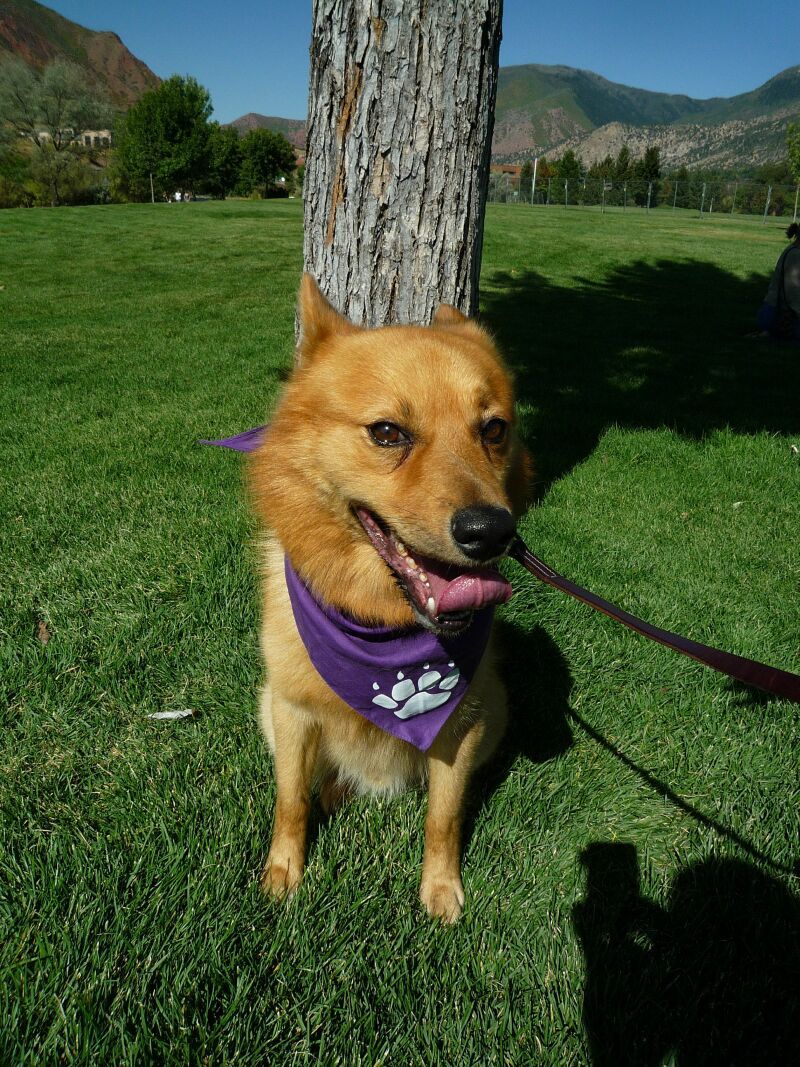
If I like it, It's mine.
If it's in my mouth, it's mine
If I had it a while ago, it's mine
If I can take it from you, It's mine.
If it's mine. it must never be yours.
If it just looks like mine, It's mine.
If I saw it first, it's mine.
If you are playing with something else and put it down, it's mine.
If I am chewing something up, all of the pieces are mine.
If it used to be yours, get over it.
If it's broken, it's yours.
We thank Cheryl McCulloch, for this submission.
|
|
Financial Assistance for Veterinary Care
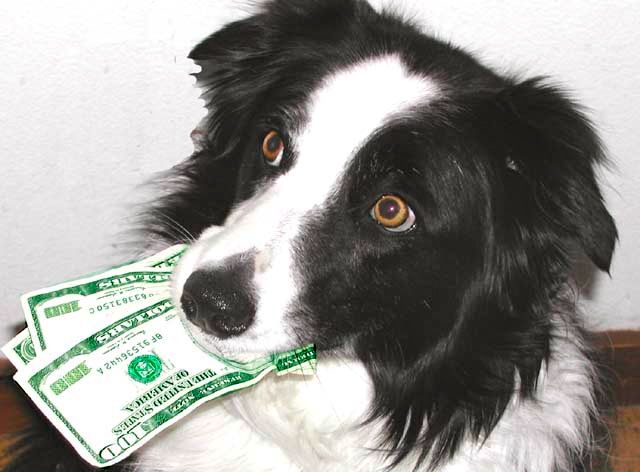
Listed below are some organizations that may be able to provide you with some financial assistance paying for veterinary care. Many of them are specific in terms of the type of medical care they will cover. I encourage you to check the organization websites for specific, up-to-date information.
Rose's Fund for Animals - (877) 505-4234
www.rosesfund.org
Email: rosesfund@aol.com
Rose's Fund recognizes that it takes more than love to save a life, and all animals deserve a chance. They will financially assist, to the best of their ability, pet owners and Good Samaritans who have an animal with a good prognosis for a healthy life, but are at a financial loss.
Land of Pure Gold Foundation (assistance limited to working dogs diagnosed with cancer) Contact: landofpuregold.com
The Land of Pure Gold Foundation provides financial aid for Working Dogs (Assistance, Detection, Search & Rescue, Enforcement, Military and Animal-Assisted Therapy Dogs) who have been diagnosed with cancer. If your dog meets these criteria you can find information about applying for a grant at http://grants.landofpuregold.com.
American Animal Hospital Association - (866) 443-5738
www.aahahelpingpets.org/
Email: info@aahahelpingpets.org
Through the AAHA Helping Pets Fund, we offer grants for veterinary care of pets that have been abandoned and those whose owners are experiencing financial hardship. AAHA-accredited veterinary practices may apply for financial assistance on behalf of their clients in need.
Angels 4 Animals - (916) 941-9119
www.Angels4Animals.org
Email: staff@angels4animals.org
Our services range from financial aid to complete treatment to those pets and pet owners in need. Angels4Animals, a non-profit organization and a program of Inner Voice Community Services, has a mission to serve as the guardian angel of animals whose caretakers find themselves in difficult financial situations. At Angels4Animals they believe that animal owners should not have to say goodbye to the animals that they love. Their work is accomplished in conjunction with veterinary clinics across the country, eager to assist as many animals, and their owners, as possible. The services offered range from financial aid to complete treatment to those pets and pet owners in need.
Animal Cancer Therapy Subsidization Society - (780) 732-3522 - Canada
http://www.actss.ca/
Email: needs@actss.ca
The Animal Cancer Therapy Subsidization Society is a registered charity in Alberta, Canada that is devoted to making cancer treatment for pets a reality. The Lucky Moffat Memorial Fund (in loving memory of a very special dog), was developed by ACTSS to insure that all pets, can receive cancer therapies, regardless of their owner's income.
The Assistance Dog United Campaign - (800) 284-DOGS (3647)
www.assistancedogunitedcampaign.org/vouchers.html
Email: info@assistancedogunitedcampaign.org
Operated in association with The Assistance Dog Institute, this nonprofit helps people with disabilities find funding to purchase service dogs. Phone: 800 284-DOGS (3647)
The Brown Dog Foundation
http://www.browndogfoundation.org/
At Brown Dog Foundation it is our mission to offer pet owners in temporary financial crisis an alternative to euthanasia when their pet faces a treatable life-threatening condition in order to restore the quality of life for pet and owner. Use the online form to apply for assistance.
Care Credit - (866) 893-7864
www.carecredit.com - http://carecredit.com/vetmed/whycc.html
A credit card company for health care, including veterinary care. With a comprehensive range of plan options, for treatment or procedure fees from $1 to over $25,000, we offer a plan and a low monthly payment to fit comfortably into almost every budget.
Cody's Club - (614) 620-2476
www.codysclub.bravehost.com/
Email: kraft.42@osu.edu
When facing radiation for your companion animal, this group may be able to make a tough decision easier. Cody's Club provides financial support for those who face radiation treatments on a limited income, and also emotional support services in the form of a hotline and in-person group that meets monthly.
Feline Veterinary Emergency Assistance (FVEAP)
www.fveap.org/sys-tmpl/door/
Email: Timothy Meeker - fveap@earthlink.net
Seniors, People with disabilities, People who have lost their job, Good Samaritans who rescue a cat or kitten - any of these folks may need financial assistance to save a beloved companion. The Feline Veterinary Emergency Assistance Program is a nonprofit 501(c)(3) organization that provides financial assistance to cat and kitten guardians who are unable to afford veterinary services to save their companions when life-threatening illness or injury strikes.
Fetch a Cure - (804) 525-2193
5609 Patterson Ave., Suite D
Richmond, VA 23226
Website: www.fetchacure.org
Email: info@fetchacure.org
Whether it be through financial support or other resources, FETCH a Cure's, Canines in Crisis program looks forward to providing families with a sense of hope.
God's Creatures Ministry - (973) 694-5155
www.all-creatures.org/gcm/help-cf.html
Email: Godscre@msn.com
This fund helps pay for veterinarian bills for those who need help.
Good Sam Fund - (614) 846-5800
www.medvetfoundation.org/index.asp
Email: mwyman1@columbus.rr.com
The MedVet Good Sam (Special Assistance and Memorial) Fund was established in 1999, well before the development of the Foundation. Its mission was then, and still is, to provide financial aid and support for sick or injured stray animals who are admitted to MedVet by Good Samaritans and animal lovers. Each grant for assistance is limited to $500 per doctor per year and per patient per year
IMOM
www.imom.org
We are dedicated to insure that no companion animal has to be euthanized simply because their caretaker is financially challenged.
Help-A-Pet - (630) 986-9504
www.help-a-pet.org
Our efforts focus on serving the elderly, the disabled, and the working poor. HelpAPet.org helps with vet bills for pets of the physically and mentally challenged, the elderly on fixed incomes, and children of the poor. Proof of income is required, and the pet owner must pay as much of the bill as they can to show the pet owner's commitment to the well being of their pet. 100% of every dollar donated goes directly to the veterinarian or medical care giver who is treating the animal.
The Perseus Foundation
www.perseusfoundation.org/new-petowner/index.cfm
Provides information and support to owners whose pets are diagnosed with cancer. Provides information on clinical trials. Provides financial assistance through its Magic Bullet Fund
The Magic Bullet Fund
www.themagicbulletfund.org/
Email: email@themagicbulletfund.org
The Magic Bullet Fund helps people who have a dog with cancer but cannot afford treatment costs.
Canine Cancer Awareness
www.caninecancerawareness.org
Email: info@caninecancerawareness.org
Our mission is to provide you with knowledge and support so that you can consult with your vet to get the best possible treatment for your dog. CCA is a nonprofit organization dedicated to fighting canine cancer. We help sponsor the veterinary costs of dogs diagnosed with cancer for those families in financial need who would not otherwise be able to afford treatment.
The Pet Fund - (916) 443-6007
www.thepetfund.com/
Email: info@thepetfund.com
The Pet Fund is a registered 501(c)3 nonprofit association that provides financial assistance to owners of domestic animals who need urgent veterinary care. Often animals are put down or suffer needlessly because their owners cannot afford expensive surgery or medical treatment. Companion animal owners must often make the difficult decision to put an animal down or neglect medical needs because of the costs involved. The purpose of the Pet Fund is to work towards a future where decisions about companion animal medical care need never be made on the basis of cost. ALL applicants are REQUIRED to contact The Pet Fund by phone BEFORE applying for funding.
United Animal Nations
www.uan.org/lifeline/index.html
E-mail: info@uan.org
The mission of LifeLine is to help homeless or recently rescued animals suffering from life-threatening conditions that require specific and immediate emergency veterinary care. We strive to serve Good Samaritans and rescue groups who take in sick or injured animals. In certain cases, LifeLine can also assist senior citizens and low-income families pay for immediate emergency veterinary care.
UK Assistance with Veterinary Bills
www.petloversonline.co.uk/financial.htm
Most of us can cope with the financial commitment involved in the day to day care of our pets. However, how many of us come out in a cold sweat when our pet is ill or injured and we know we have to take it to the vet? Most of us are fortunate enough to be able to afford it but, some of us who love our animals dearly cannot.
Feline Outreach
www.felineoutreaach.org
Email: general@felineoutreach.org
Feline Outreach is a charitable organization formed to promote the routine and medical care of companion animals, particularly cats. (Note: Feline Outreach was founded by people who have diabetic cats.)
Cats in Crisis
www.catsincrisis.org
Cats in Crisis Inc. is a 501(c)(3) non-profit organization dedicated to helping individuals and humane organizations care for cats with chronic or emergency medical conditions through financial and fundraising assistance. You must complete the online application to be considered for aid.
Shakespeare Animal Fund - (775) 342-7040
www.shakespeareanimalfund.org/
Email: theshakefund@aol.com
Anyone can apply for funds, but SAF offers assistance primarily to those on fixed incomes or with annual incomes below $35,000. Exceptions are made depending on circumstances. It is always a one-time grant
New York SAVE
www.nysave.org
NY S.A.V.E, Inc., is a non-profit organization dedicated to the aid and assistance of low-income pet owners residing in one of the five boroughs of New York City, whose pet is in need of emergency veterinary care.
Piggers' Pals
www.piggerspals.org/mission.html
Email: info@piggerspals.org
A nonprofit organization designed to assist families in need seek specialty level care for their pets. The foundation will accept applications from individuals or families that require financial assistance to provide advanced medical and/or surgical veterinary care that will extend both quantity and quality of life for their pets that would otherwise not be available to them.
Int'l Assoc of Assistance Dog Partners VCP Program
www.iaadp.org/index.html
Email: iaadp@aol.com
AADP has established an emergency veterinary fund to provide financial aid to United States IAADP Partner Members whose assistance dogs require high cost veterinary intervention beyond their ability to pay.
Pet Diabetes Fund
www.petdiabetes.org/fund/
Not accepting applications at this time
The Mosby Foundation
www.themosbyfoundation.org/
Email: info@themosbyfoundation.org
The Mosby Foundation would like to help everyone who asks for aid. However, this is simply not possible. Due to the overwhelming number of applications we receive daily and the limited funds we have to work with, we simply cannot help everyone. Our priority for accepting an application for funding will continue to be a life-saving emergency confirmed by a licensed veterinarian either by fax or phone. To apply for a grant call 540-939-4034 or e-mail info@themosbyfoundation.org
Regional
Colorado
Harrison Memorial Animal Hospital - (303) 722-5800 ext 525
www.hmah.org/pageinpage/qualified_clients.cfm
All Treatment clients (excluding Spay and Neuter), other than veterinary referrals, must go through a qualification process to receive care for their pets at Harrison Memorial Animal Hospital. This takes place over the phone to determine your level of financial capacity. Please be prepared to answer personal questions and have the following information ready when calling one of our Client Specialists.
|
|
Why Breed Specific Legislation Doesn't Work Educational Presentation
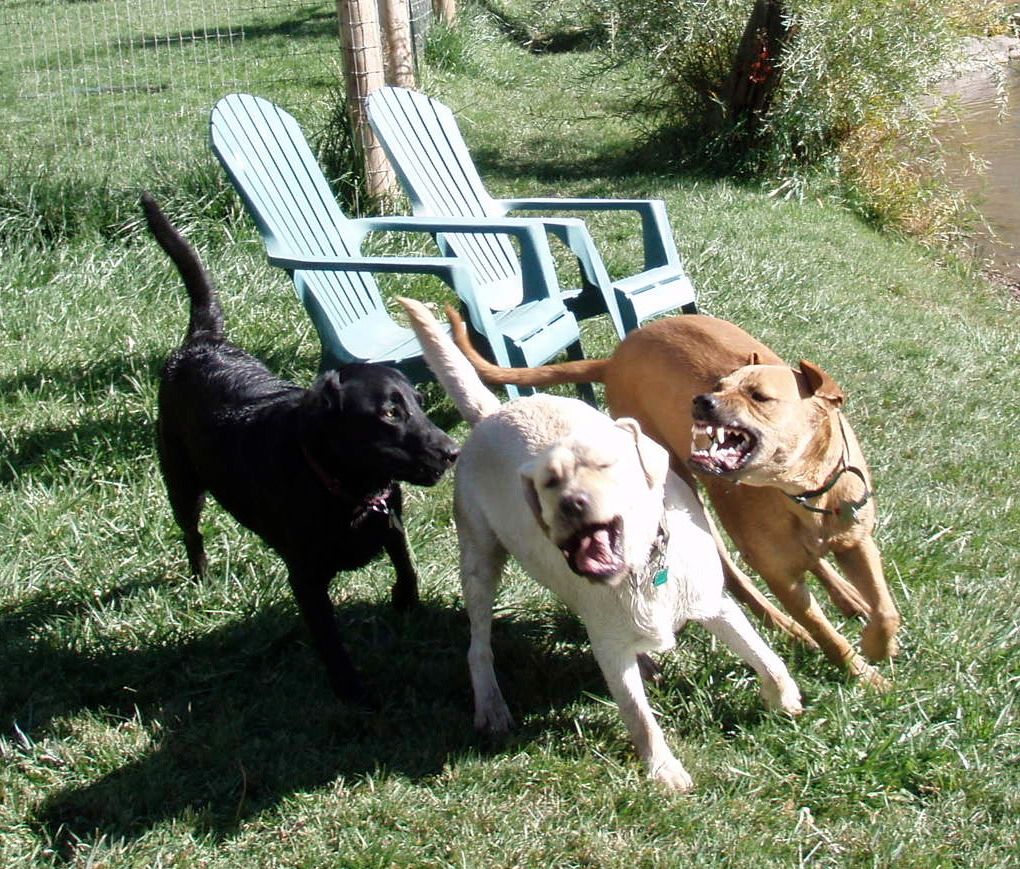
The AKC Government Relations Department is pleased to present the second in a series of online PowerPoint presentations that discuss important issues in canine legislation. These informative presentations, narrated by AKC GR staff, can be downloaded or played directly from the AKC website at club meetings and educational events. New this month is:
Why Breed-Specific Legislation Doesn't Work - This presentation provides an overview of breed-specific legislation, the inherent problems with these laws, and specific anecdotes of cases where it has proved ineffective. It also mentions allies in the fight against BSL and provides positive alternative solutions for communities dealing with dangerous dog issues.
Please note that presentations will take a few seconds to a few minutes to download, depending on your connection speed.
AKC clubs and federations are invited to use this and future presentations to educate members and guests about current legislation and how to work together to protect the rights of responsible dog owners.
To access this downloadable presentation, go to the AKC Government Relations website and click Presentations in the left panel or visit the AKC Government Relations Toolbox.
|
|
Grand Valley Kennel Club
WINTER 2012 AKC-Sanctioned MATCHES!
Saturday and Sunday Jan 7th & 8th
Mesa County Fair Grounds
2785 Highway 50 - Community Building (C Building)
Saturday January 7th Grand Valley Kennel Club
EVERYONE is welcome
$8 per class - Registration from 7:30 to 8:30
Obedience and Rally Begins at 9:00
Conformation Begins immediately following, approximately 10:00,
Best Puppy (4-12mo),
Best in Match, Best Bred-By Exhibitor
Best Jr. Showmanship
Sunday January 8th Grand Valley Kennel Club
EVERYONE is welcome
$8 per class - Registration from 7:30 to 8:30
Obedience and Rally Begins at 9:00
Conformation Begins immediately following, approximately 10:00,
Best Puppy (4-12mo),
Best in Match, Best Bred-By Exhibitor
Best Jr. Showmanship
If you have any questions please contact
Noelle Blair 986-9629 rottndog@aol.com
Johnnie Farmer 210-9005 thepetspagj@gmail.com
|


Pamela Levy Newsletter Editor |
|
|
|
|
|
|
|
|